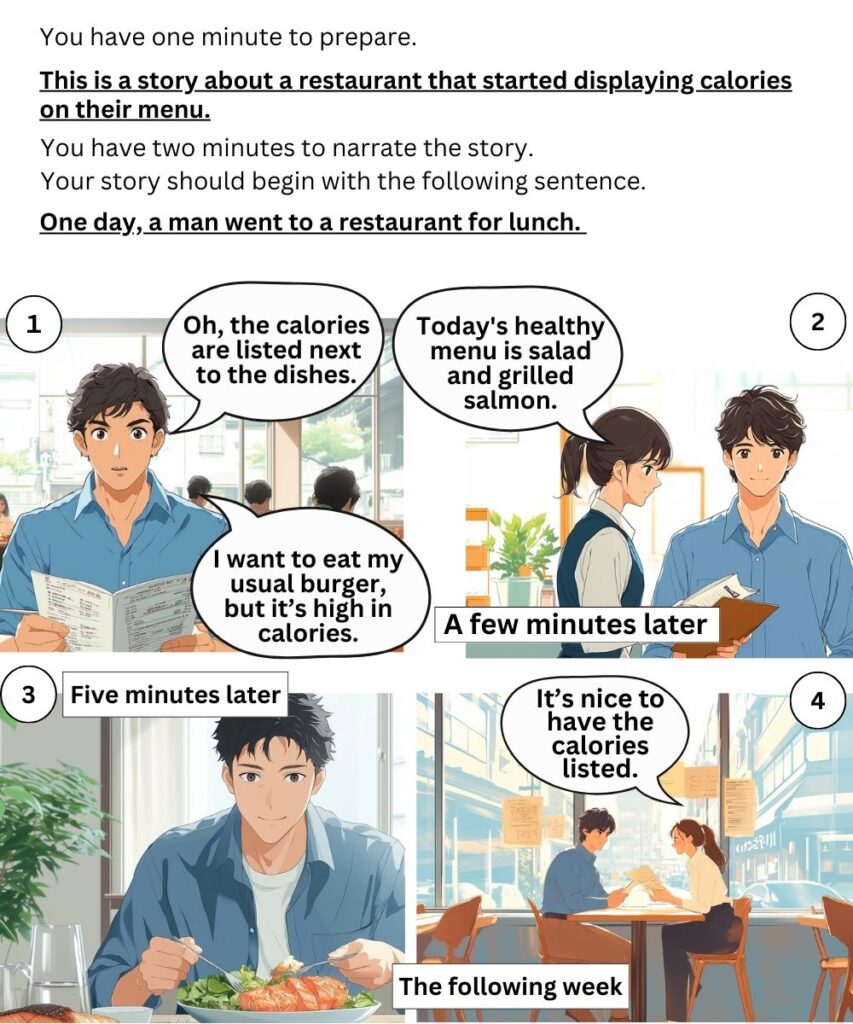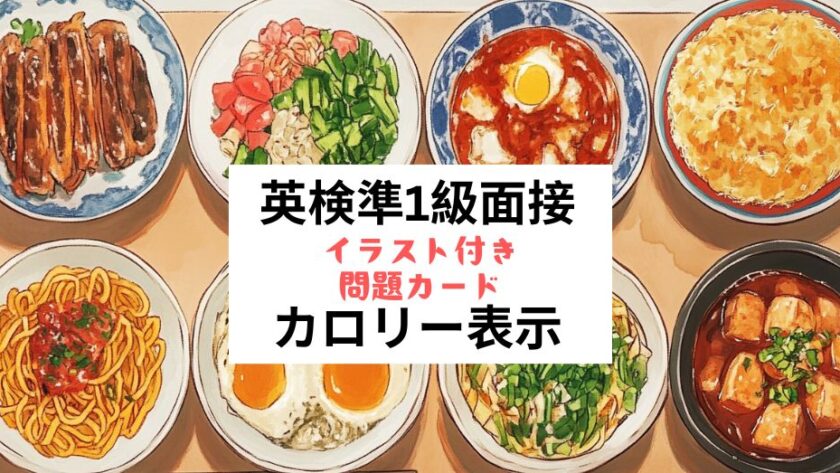実際の出題形式(問題カード)で英検準1級の面接練習を独学できるページです。
2024年度リニューアル対応!
所要時間:概ね8分
目次
- 1 質問概要
- 2 問題カード
- 3 ナレーションと質問
- 4 質問音源チャレンジ
- 5 解答例
- 6 カロリー表示・ジョーク
- 6.1 1. Why did the salad blush? Because it saw the calories of the burger next to it!
- 6.2 2. I asked the waiter if the calorie count on the menu was accurate. He said, “Sure, if you only eat half of it!”
- 6.3 3. My favorite part of the menu is the calorie section—so I know what to ignore!
- 6.4 4. I love how the calories are listed on the menu. It makes me feel guilty before I even order!
- 6.5 5. The restaurant’s calorie display is like a spoiler for my meal—I didn’t want to know the ending!
- 6.6 6. I asked for the “low calorie” option, and they brought me the menu without the dessert section!
質問概要
ナレーション内容を考える(1分間)
イラストの内容を説明するナレーションを考える
ナレーション(2分間):ナレーションを始める
※2分以上続く場合は、途中でも中止させられるので注意
Q&A(No. 1):イラスト関連の質問
イラストに関連した質問。「問題カード」を見ながら解答できます。
※登場人物が考えている事などを聞かれます。
Q&A(No.2, No. 3)
問題カードに関連した、受験者の意見を問う質問
Q&A(No. 4)
問題カードのトピックに少し関係のある質問。受験者の意見を問う質問
※この<No. 4>質問文に「導入文」が追加されました。
問題カード

ナレーションと質問
ナレーション指示
<指示>Look at the pictures carefully and read the directions silently for one minute.(1分間)
<指示>Now, please begin your narration.(2分間)
Question No.1
Please look at the third picture. If you were the man, what would you be thinking?
Question No.2
Do you think it’s important for restaurants to include calorie information on their menus?
Question No.3
Do you believe that people are becoming more conscious of healthy eating habits?
Question No.4
Recently, there has been growing awareness of the importance of healthy eating among young people. Should schools teach children more about nutrition and healthy eating habits?
質問音源チャレンジ
本番のように、英語の質問を聞いて答える練習をしてみましょう。
ナレーション準備
ナレーション開始
Question 1 mp3
Question 2 mp3
Question 3 mp3
Question 4 mp3
解答例
ナレーション例
<1> One day, a man went to a restaurant for lunch. When he looked at the menu, he noticed that the calories were listed next to the dishes. He wanted to order his usual burger but realized it was high in calories.
ある日、男が昼食のためにレストランに行った。彼がメニューを見ると、料理の横にカロリーが表示されていることに気づいた。彼はいつものハンバーガーを注文したかったが、それが高カロリーであることに気づいた。
high in calories = カロリーが高い「形容詞 + in + 名詞」
rich in flavor – 味が豊かである
low in sugar – 砂糖が少ない
high in protein – タンパク質が豊富である
poor in nutrients – 栄養が乏しい
low in fat – 脂肪が少ない
<2> A few minutes later, he asked the waitress if there were any healthier options available. The waitress recommended the day’s healthy menu, which included a salad and grilled salmon. The man decided to follow her suggestion.
数分後、彼はウェイトレスに、他に健康的な選択肢があるかどうか尋ねた。ウェイトレスは、その日の健康メニューとして、サラダとグリルサーモンを勧めた。男は彼女の提案に従うことに決めた。
follow her suggestion = 彼女の提案に従う
「意見を聞く・従う」の他の言い方:
heed advice – 忠告を聞く
listen to someone – 誰かの言うことを聞く
obey – 従う
take someone’s advice – 誰かの助言に従う
act on – 〜に基づいて行動する
<3> Five minutes later, his meal arrived, and he enjoyed the healthy food. He was pleased with his choice and thought that it was helpful to have the calories listed on the menu.
5分後、彼の食事が運ばれてきた。彼は健康的な料理を楽しみ、その選択に満足した。メニューにカロリーが表示されているのは便利だと感じた。
<4> The following week, the man returned to the same restaurant with a friend. He mentioned how useful the calorie information was and suggested that his friend try a healthier dish as well. His friend agreed, and they both enjoyed their meal and appreciated the restaurant’s effort to promote healthy eating. From that day on, the man became more mindful of his food choices and frequently opted for healthier meals. (178 words)
翌週、男は友人を連れて再び同じレストランを訪れた。彼はカロリー情報がいかに役立つかを友人に伝え、友人にも健康的な料理を試すよう勧めた。友人も同意し、二人とも食事を楽しみ、レストランの健康的な食事を促進する取り組みに感謝した。その日以来、男は食事の選択に気を遣うようになり、頻繁に健康的な食事を選ぶようになった。
suggested that his friend try a healthier dish について、「try」が原形になっているのに気付いたかな?
「suggest」の後に「that節」が来る場合、その節内の動詞は通常原形になるよ。
「that節」ではなく、以下の例文の様に「動名詞(-ing 形)」を使うことも出来るよ。
例文:
He suggested that his friend try the new restaurant.
(彼は友人に新しいレストランを試してみるよう提案しました。)
She suggested going to the park.
(彼女は公園に行くことを提案しました。)
Question 1 解答例
質問:3枚目の写真を見てください。あなたが男性だったら、何を考えていますか?
If I were the man, I would be thinking that it was a good decision to choose a healthier meal. I might also feel relieved that I could enjoy something tasty without worrying too much about the calories.
私が男性だったら、健康的な食事を選んでよかったと考えているでしょう。また、美味しいものを食べながらカロリーを気にしすぎなくて済んだことに安心しているかもしれません。
「…without worrying too much about the calories」のように、「without …ing」はシンプルで使い勝手がいいね。使えるようにしておこう!
Question 2 解答例
レストランのメニューにカロリー情報を載せることは重要だと思いますか?
Yes. Including calorie information on menus helps customers make informed decisions about their food choices, which can contribute to healthier eating habits.
はい。メニューにカロリー情報を含めることで、顧客は十分な情報に基づいて食品の選択を決定でき、より健康的な食習慣につながります。
No. While calorie information can be useful, it might lead to unnecessary stress for some customers who feel pressured to choose lower-calorie options, even if they prefer something else.
いいえ。カロリー情報は役立つこともありますが、低カロリーのものを選ばなければならないというプレッシャーを感じるお客さんもいて、不要なストレスを招くこともあると思います。
Question 3 解答例
人々は健康的な食習慣に対して、より意識的になっていると思いますか?
Yes. With the growing availability of nutritional information and an increased awareness of health issues, more people are making efforts to eat healthier.
はい。栄養に関する情報が増え、健康問題に対する意識が高まっているので、より多くの人が健康的な食生活を心がけるようになっていると思います。
No. Although there is more information available about healthy eating, many people still prefer convenience and taste over nutrition, so I don’t think everyone is becoming more conscious of healthy habits.
いいえ。健康的な食事についての情報は増えましたが、依然として多くの人が栄養よりも利便性や味を重視しているので、すべての人が健康的な習慣に対して意識的になっているとは思いません。
Question 4 解答例
近年、若者の間で健康的な食事の重要性に対する意識が高まっています。学校は子どもたちに栄養と健康的な食習慣についてもっと教えるべきだと思いますか?
Yes. Teaching children about nutrition and healthy eating habits at a young age can help them develop lifelong healthy behaviors, reducing the risk of diet-related health issues in the future.
はい。子どもの頃から栄養と健康的な食習慣について教えることで、将来的に食生活に関連する健康問題のリスクを減らし、生涯にわたる健康的な行動を身につけることができると思います。
No. While it’s important for children to learn about healthy eating, schools already have a lot of subjects to cover, and adding more to the curriculum might overwhelm both students and teachers.
いいえ。子どもたちが健康的な食事について学ぶことは大切ですが、学校にはすでに多くの科目があり、これ以上カリキュラムに追加すると、生徒や教師に負担がかかるかもしれません。
面接練習はask本校にお尋ねください:無料体験レッスン予約
こちらの投稿もおススメです:英検準1級面接問題カード|在宅勤務トピック質問と回答例
カロリー表示・ジョーク
1. Why did the salad blush? Because it saw the calories of the burger next to it!
なぜサラダが赤面したの?隣のバーガーのカロリーを見たから!
解説:
このジョークは、サラダが「赤面」するという擬人化の表現を使っています。サラダは通常、健康的な食べ物として認識されており、それに対してバーガーは高カロリーであることが多いです。サラダがバーガーのカロリーの高さに驚いて恥ずかしくなる、というおかしさがあります。
ウェイターに「メニューのカロリー表示は正確ですか?」と聞いたら、「もちろん、半分だけ食べればね!」と言われた。
解説:
このジョークは、メニューに表示されているカロリーが実際には食べる量によって変わることを暗示しています。つまり、フルポーションで食べるとカロリーが多すぎることを皮肉的に表現しています。
メニューで一番好きな部分はカロリー表示部分—無視する場所が分かるから!
解説:
このジョークは、カロリー表示があってもそれを無視して好きなものを注文する人の気持ちをユーモラスに表現しています。カロリー表示があるおかげで、逆に無視すべき部分が分かるという皮肉です。
メニューにカロリーが表示されているのが好き。注文する前から罪悪感を感じられるからね!
このジョークは、カロリー表示があることで、注文する前から罪悪感を感じるという感情を表しています。健康的な選択をしなければというプレッシャーを皮肉ったものです。
5. The restaurant’s calorie display is like a spoiler for my meal—I didn’t want to know the ending!
レストランのカロリー表示は食事のネタバレみたいだよ—結末は知りたくなかったのに!
解説:
このジョークは、カロリー表示を映画や本の「ネタバレ」に例えています。料理を楽しむ前にカロリーの情報を知ってしまうことで、楽しみが半減するというおかしさを表現しています。
「低カロリーの選択肢をお願いします」と言ったら、デザートの部分がないメニューを持ってきてくれた!
解説:
このジョークは、レストランで「低カロリー」を求めると、デザートが含まれないメニューを渡されるという冗談です。デザートが高カロリーであるという事実を利用して、低カロリーを実現するためにデザートを避けるという皮肉を込めています。




